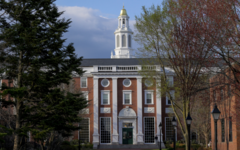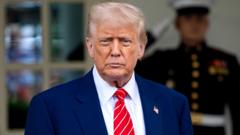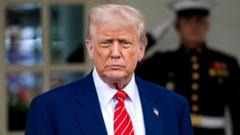The Harvard lawsuit contends that the suspension of billions in federal funding violates its constitutional rights and threatens vital research programs.
Harvard University Takes Legal Action Against Trump Administration Over Funding Freeze

Harvard University Takes Legal Action Against Trump Administration Over Funding Freeze
Harvard University's lawsuit claims the Trump administration's freeze on federal grants is unlawful and damaging to critical research.
Harvard University has initiated legal proceedings against the Trump administration, asserting that the recent freeze on federal grants—amounting to billions of dollars—is illegal. Harvard's President, Alan M Garber, announced the lawsuit in a letter to the university community, explaining that the $2 billion funding suspension would severely impede essential disease research efforts. The university, known as the wealthiest institution globally, previously rebuffed a series of demands from the Trump administration aimed at addressing diversity initiatives and anti-Semitism concerns on campus.
In response to the legal challenge, the White House declared that the era of abundant federal assistance to Harvard has concluded. The governmental funding cuts extend to other prominent universities, with a new task force targeting 60 institutions for alleged anti-Semitism issues. President Trump himself has criticized universities for not safeguarding Jewish students during previous protests related to the Gaza conflict.
Garber cautioned in his letter that the adverse effects of governmental overreach would be profound and long-lasting, affecting pivotal studies on diseases such as pediatric cancer, Alzheimer's, and Parkinson's. The lawsuit contends that the federal government's withdrawal of support violates Harvard's rights and is an attempt to exert control over academic governance.
The Trump administration has indicated that an additional $1 billion in federal funding may also face suspension. Harvard's funding for research activities is substantial, totaling approximately $9 billion annually, and the potential loss could threaten its tax-exempt status and ability to accept international students.
Garber, who openly identifies as Jewish, admitted that there have been issues of anti-Semitism within the university but noted that measures are being taken to address these challenges, including forthcoming reports from task forces investigating anti-Semitism and anti-Muslim bias.
The Trump administration’s actions have also impacted other elite institutions such as Cornell University, which faces a freeze of $1 billion, and Brown University, with a cut of $510 million. Federal funding plays a critical role in fostering scientific advancement at these universities.
Furthermore, some institutions, including Columbia University—central to last year's pro-Palestinian protests—agreed to certain demands after a threat of losing $400 million in federal funds. The government's requests to Harvard included accepting external audits of its curriculum and related data. The university fiercely rejected these stipulations, characterizing them as a federal overreach.
Former President Barack Obama, a Harvard alumnus, has expressed support for the institution, calling the funding freeze unlawful. In a statement, the White House rebuffed Obama's perspective, arguing that taxpayer funds should not be directed to enrich "overpaid bureaucrats" at universities. Polling data from Gallup indicates a decline in public trust in higher education across the political spectrum, particularly among Republican voters, likely stemming from the perception that universities promote a political agenda.





















